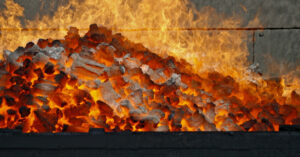
PJSC Zaporizhkox, one of Ukraine’s largest producers of coke and chemical products and part of the Metinvest Group, increased its production of blast furnace coke by 0.6% in January-July this year compared to the same period last year, from 509,600 tons to 512,900 tons.
According to the company, 78.9 thousand tons of coke were produced in July, compared to 76.3 thousand tons in the previous month.
As reported, in 2024, Zaporizhkox increased its production of blast furnace coke by 2.1% compared to 2023, to 874.7 thousand tons from 856.8 thousand tons.
In 2023, Zaporizhkox increased its production of blast furnace coke by 16% compared to 2022, to 856,800 tons from 737,400 tons.
Zaporizhkox has a complete technological cycle for the processing of coke and chemical products.
Metinvest is a vertically integrated mining group of companies. Its main shareholders are the SCM Group (71.24%) and Smart Holding (23.76%). Metinvest Holding LLC is the managing company of the Metinvest Group.
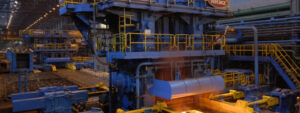
Novokramatorsk Machine-Building Plant (NKMZ, Kramatorsk, Donetsk region) plans to increase production and sales by 81.5% in 2025 compared to 2024, to UAH 2.08 billion.
The relevant plans are contained in the company’s financial report for 2024, published in the NSSMC disclosure system.
“The company’s activities in 2025 will, with a high degree of probability, be limited. Based on these assumptions for 2025, production plans have been approved for 12,700 tons of machinery and equipment for the metallurgical, mining, construction, lifting, loading, and unloading industries, as well as spare parts,” the report says.
NKMZ notes that this year, the plant’s metallurgical production plans include the manufacture of 21.78 thousand tons of liquid steel, 120 tons of liquid pig iron, 1.1 thousand tons of steel castings, and 100 tons of pig iron, as well as 15.84 thousand tons of forgings.
“The development of projects for the promising further development of the enterprise, the formation of measures aimed at the successful operation of the enterprise, the creation of new equipment and research and development, the technical re-equipment and introduction of resource-saving technologies will begin after the end of the war in Ukraine,” the plant said.
At the same time, measures are planned for 2025 to conduct a supervisory audit of the quality management system by ISOaccelerator to confirm and extend the validity of the ISO 9001:2015 certificate.
The marketing strategy of PJSC NKMZ for the current year is to maintain and expand strategic market segments and increase its presence in Eastern, Central, and Western Europe, and Central Asia.
According to the report, in 2024, the main market segments for NKMZ PJSC products were Asia (54.4% of sales), Europe (24.9%), and Ukraine (17.9%).
In terms of total sales in monetary terms, 55.2% were rolling rolls, 18.1% were metallurgical and rolling equipment, 7.3% were mining and ore equipment, and other equipment accounted for 19.4%.
Investments in production development last year amounted to UAH 28.15 million.
As reported, in 2024, NKMZ’s net income increased 3.2 times compared to the previous year, reaching UAH 1 billion 146 million, with exports to European and Asian countries accounting for UAH 941.3 million (82%). Net profit amounted to UAH 36.33 million (in 2023, the company reported a loss of UAH 856.93 million).
At the same time, in 2024, Slovakia, Lithuania, Egypt, and Luxembourg joined Uzbekistan, Kazakhstan (where exports fell 12.3 times over the year), and India (where exports grew 31 times) as the largest importers of NKMZ products. Supplies within Ukraine increased 5.2 times to UAH 204.6 million.
NKMZ, whose capacity was forced to be mothballed with the start of the full-scale military invasion of Ukraine by the Russian Federation, began to partially resume operations in October 2023.
NKMZ is a city-forming enterprise in Kramatorsk, the largest in Ukraine in the production of rolling, metallurgical, forging and pressing, hydraulic, mining, lifting and transport, hydraulic and railway equipment.
Before the war in 2021, the company’s net income exceeded UAH 6 billion.
At the beginning of 2023, the average number of employees exceeded 7,200, and at the beginning of 2025, it was 5,660.
ASIA, EUROPE, EXPORT, NKMZ, PRODUCTION
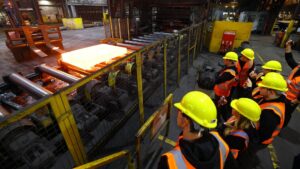
In 2024, the Metinvest mining and metallurgical group reduced its rolled steel production in the UK and the EU by 13% to 1.367 million tons, which was caused by unfavorable market conditions in the EU, in particular the availability of cheap Russian slab, according to the group’s annual report.
According to the report, flat steel production at Metinvest Trametal decreased by 3% to 466,000 tons, at Ferreira Valsider by 45% to 190,000 tons, and at Spartan UK by 22% to 153,000 tons.
Overall, Trametal accounted for 34% of total production in the UK and the EU last year (31% in 2023), Ferreira Valsider for 14% (22%), Promet Steel for 41% (35%), and Spartan for 11% (12%).
As reported, in 2024, Metinvest reduced sales of finished metallurgical products by 5% compared to the previous year, semi-finished products by 3%, but increased coke sales by 6%, and sales of other products and services increased by 33%.
Revenue from the metallurgical segment remained virtually unchanged compared to 2023 and amounted to $4.824 billion, while the segment’s share in consolidated revenue decreased by 6 percentage points (pp) to 60%.
At the same time, sales of merchantable pig iron decreased by 15% to $266 million due to a 16% reduction in shipments to 558 thousand tons. In particular, the reduction in resales and production volumes of the group amounted to 12% and 52%, respectively. The share of resales in total sales increased by 4 p.p. to 95%. North America and Europe remained the main markets for this product. They accounted for 71% and 23% of total shipments last year, compared with 70% and 26% in 2023.
Sales of semi-finished products increased by 9% last year to $389 million, thanks to a 16% increase in sales volumes to 716,000 tons amid a reduction in inventories. Shipments to the Middle East and North Africa (MENA) increased by 237,000 tons, accounting for 50% of total shipments in 2024 (20% in 2023). In contrast, shipments to Europe decreased by 143,000 tons and accounted for 38% of total sales (68% in 2023). The average selling price declined in line with the dynamics of CFR Turkey square billet prices (down 7% compared to 2023).
In 2024, flat steel sales declined by 6% to $2.244 billion. This was due to lower sales prices following the dynamics of the corresponding benchmark for hot-rolled coils CFR Italy, which fell by 9%. Total shipments increased by 7% to 3.047 million tons, driven by a 26% increase in resales to 2.111 million tons, which increased their share in total shipments to 69% (up 10 percentage points). Deliveries were primarily to Europe, which accounted for 72% of the total (71% in 2023). Sales in the region increased by 193,000 tons thanks to demand from key customers, expansion of the customer base, and stable operations at Black Sea ports. Domestic sales accounted for 23% of sales (25% in 2023).
Sales of long products remained unchanged in 2024 at $948 million. Shipments increased by 5% to 1.372 million tons, primarily due to higher production volumes at Kametstal. Ukraine and Europe remained the main markets for these products. They accounted for 45% and 35% of total sales, respectively, compared with 48% and 39% in 2023. The Group increased its shipments to North America, which accounted for 17% of total sales in 2024, compared with 12% a year ago. Average sales prices declined in line with the benchmark for CFR Turkey square billets.
The report notes that in 2024, Metinvest achieved significant results from operational improvements. In particular, in the metallurgical segment, coke consumption at Kametstal was reduced and blast furnace productivity was improved thanks to the rapid adaptation of pulverized coal injection technology to alternative types of coal under military supply restrictions. In addition, the optimization of raw material procurement contributed to the positive results.
Metinvest is a vertically integrated group of mining and metallurgical companies. Its enterprises are located in Ukraine, in the Donetsk, Luhansk, Zaporizhia, and Dnipropetrovsk regions, as well as in the European Union, the United Kingdom, and the United States. The main shareholders of the holding company are SCM Group (71.24%) and Smart Holding (23.76%). Metinvest Holding LLC is the management company of the Metinvest Group.
EU, METINVEST, PRODUCTION, rolling, UK
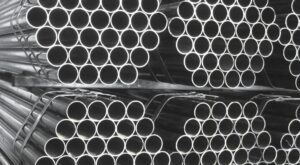
PJSC Centravis Production Ukraine (Nikopol, Dnipro region), a part of Centravis Ltd. holding, presented two projects to modernize production and expand pipe production for a total of $14.5 million at the Ukraine Recovery Conference (URC2025) held on July 10-12 in Rome.
According to the company’s information in the URC project catalog, the first project concerns the segment of oil and gas tubular goods (OCTG). It involves the development and supply of seamless pipes and stainless steel pipes that meet 25 CRA (corrosion-resistant alloy) standards, with a focus primarily on the fast-growing market for carbon capture and storage (CCS) infrastructure in the United States and Europe.
It is expected that new equipment will be purchased to produce pipes, couplings and casing for CO2 or oil wells in accordance with the API 5 CRA standard. Diameter – from 60 mm to 240 mm, length 11-13 m, wall thickness – in a wide range.
Target market: carbon capture applications in the US and Europe, oil and gas in the US, Europe, and the Middle East.
The scope of work for the project has already been determined, the preliminary tender process for its budget has been completed, and the project is ready for implementation. The equipment is planned to be installed at Centravis’ premises in Nikopol in the hot shop. API 5 CRA licensing is expected by the end of 2025.
The total project budget is $11 million, and $10 million needs to be raised, according to the company. Expected financial indicators: net present value (NPV) – $13.3 million, revenue in 2030 – $45 million, EBITDA in 2030 – $18 million.
The project launch period is two years.
Until 2025, $0.1 million will be invested in the development of the concept and technical design, this year $0.3 million will be needed for design, in 2026 – $4.6 million for construction, in 2027 – $6 million for the start of operation.
The second project is to expand the product range by launching the production of small-sized (4 mm in diameter) seamless stainless pipes with high precision. The project will allow the company to enter the hydrogen, semiconductor, medical, and aerospace industries. It is expected to expand Centravis’ product offering, strengthening its position in the precision tubing market, as this is a highly profitable segment. The target market is America, Europe, Asia, and the Middle East.
The technological parameters of the project include the purchase of equipment to support production.
This project is also ready to be implemented: the scope of work has been determined, and the preliminary tender process for its budget has been completed. The equipment is planned to be installed at the Centravis premises in Uzhhorod. At the same time, it is specified that this project will be developed mainly on its own.
Its total budget is $3.5 million, and $3 million is needed to raise it. Expected financial indicators: net present value (NPV) – $5.5 million, revenue in 2030 – $7.5 million, EBITDA in 2030 – $2.5 million.
The project launch period is two years.
At the same time, $0.2 million should be invested in the project in 2025 for design and construction, and in 2026, funding of $3.3 million will be required to start operations.
As reported, Centravis increased its production of seamless stainless pipes by 12.6% in 2024 compared to 2023, to 13.7 thousand tons. Centravis exported almost all of its products.
The company plans to increase production to 15 thousand tons in 2025.
“Founded in 2000, Centravis is one of the ten largest producers of seamless stainless steel pipes in the world. Its main production facilities are located in Nikopol (Dnipropetrovska oblast). In 2023, the company opened a branch in Uzhhorod.
Centravis Holding Ltd. was established on the basis of Nikopol Stainless Pipe Plant CJSC, service and trading companies of Production and Commercial Enterprise YUVIS LLC. Its shareholders are members of the Atanasov family. Centravis Ltd. owns 100% of the shares in Centravis Production Ukraine.
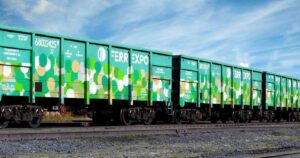
Ferrexpo plc, a mining company with its main assets in Ukraine, produced 2,169,631 tons of pellets in January-June this year, which is 34.2% less than in January-June last year (3,297,441 tons).
According to the company’s press release on Monday, total production of commercial products (pellets and iron ore concentrate) in the first half of 2025 decreased by 9% compared to the first half of 2024, to 3 million 393,135 thousand tons. In particular, the output of marketable concentrate amounted to 1 million 223.504 thousand tons against 429.865 thousand tons, respectively. The company also produced 81,787 thousand tons of DR pellets (in the first half of 2024 – 162,645 thousand tons) and 2 million 87,844 thousand tons of premium pellets (a decrease of 33.4%).
The press release notes that from January to April 2025, the amount of VAT refunds denied amounted to $31 million. Due to the current suspension of VAT refunds and the associated decline in financial liquidity, the group was forced to reduce production from two to one pelletizing line and also to reduce the production of high-quality concentrate. As a result, total commercial production for the second quarter amounted to 1.3 million tons, down 40% from 2.1 million tons in the first quarter.
However, the group demonstrated flexibility and agility by continuing to benefit from strong demand for its concentrate from customers in China, which accounted for more than a third of its product mix in the first two quarters of 2025, the statement said.
Among other things, it has made efforts to reduce its costs in order to remain financially viable. This includes reducing working hours for employees, cutting purchases of goods and services, and suspending all non-essential capital expenditures, overhead costs, and corporate social responsibility expenses.
Commenting on the group’s performance, interim CEO Lucio Genovese noted that the strong momentum at the beginning of the year, which reflects, in particular, increased quarterly production since the full-scale invasion in February 2022, was significantly limited in the second quarter as the company began to feel the impact of tax authorities’ decisions to suspend VAT refunds. As a result, production fell to 1.3 million tons in Q2 2025.
“Despite the weaker iron ore pellet market, we were able to significantly change our production portfolio and take advantage of strong demand in China for our high-quality low-alumina iron ore concentrates. During the first six months of 2025, concentrate sales accounted for 36% of our production portfolio, three times more than in the same period a year ago. In a challenging operating and market environment for iron ore, it is encouraging that we have been able to be so flexible and take advantage of the demand for high-quality concentrates,” said the top manager.
At the same time, he pointed out that lower iron ore prices and reduced production had a negative impact on profitability. The situation was exacerbated by higher prices for raw materials such as gas and electricity. During the second quarter, the group worked hard to reduce its costs in order to remain financially viable.
“This includes reducing working hours or leave for approximately 37% of employees, reducing purchases of goods and services, and suspending all non-essential capital expenditures, CSR, and humanitarian expenditures. At the same time, every effort is being made and measures are being taken with the relevant authorities and government agencies in Ukraine and internationally to try to resolve the issue of the suspension of VAT refunds,” Genovese added.
As reported, Ferrexpo produced 1 million 347,749 thousand tons of pellets in Q1-2025, which is 26% lower than in January-March last year (1 million 813,973 thousand tons). At the same time, total production of commercial products (pellets and iron ore concentrate) in Q1 2025 increased by 3% compared to Q1 2024, to 2 million 125.467 thousand tons. In particular, the output of marketable concentrate amounted to 777,718 thousand tons, compared to 240,516 thousand tons in Q1-2024. The company also produced 81,879 thousand tons of DR pellets (not produced in Q1-2024), 1 million 105.049 thousand tons of premium-grade pellets (a decrease of 36%) and 160.913 thousand tons of other pellets (an increase of 95%).
In 2024, Ferrexpo increased its production of pellets by 58% compared to 2023, to 6 million 70.541 thousand tons from 3 million 845.325 thousand tons. In the fourth quarter of 2024, it produced 1 million 503.373 thousand tons of pellets, which is 18% higher than in the previous quarter (1 million 269.727 thousand tons).
At the same time, total production of marketable products (pellets and iron ore concentrate) in 2024 increased by 66% compared to 2023, to 6 million 889.879 thousand tons from 4 million 152.028 thousand tons. In particular, the output of marketable concentrate reached 819,338 thousand tons compared to 306,703 thousand tons in 2023. The company also produced 489,720 thousand tons of DR pellets, 4 million 984,990 thousand tons of premium pellets, and 595,831 thousand tons of other pellets.
In 2023, Ferrexpo produced 3.845 million tons of pellets, which is 36.5% less than in 2022.
Ferrexpo owns 100% of Yeristovsky GOK LLC, 99.9% of Bilanivsky GOK LLC, and 100% of Poltavsky GOK PJSC.
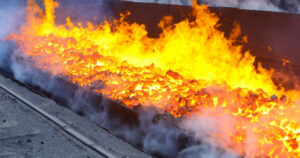
Zaporizhkox, one of Ukraine’s largest producers of coke and chemical products and part of the Metinvest Group, reduced its production of blast furnace coke by 4.9% in January–May this year compared with the same period last year, to 357,800 tons from 362,700 tons.
According to the company, 76,000 tons of coke were produced in May, compared to 72,060 tons in the previous month.
As reported, Zaporizhkox increased its production of blast furnace coke by 2.1% in 2024 compared to 2023, to 874,700 tons from 856,800 tons.
In 2023, Zaporizhkox increased its production of blast furnace coke by 16% compared to 2022, to 856,800 tons from 737,400 tons.
Zaporizhkox produces about 10% of the coke produced in Ukraine and has a complete technological cycle for the processing of coke-chemical products. In addition, it produces coke oven gas and petroleum coke.
Metinvest is a vertically integrated mining group of companies. Its main shareholders are the SCM Group (71.24%) and Smart Holding (23.76%), which jointly manage the company.
Metinvest Holding LLC is the managing company of the Metinvest Group.